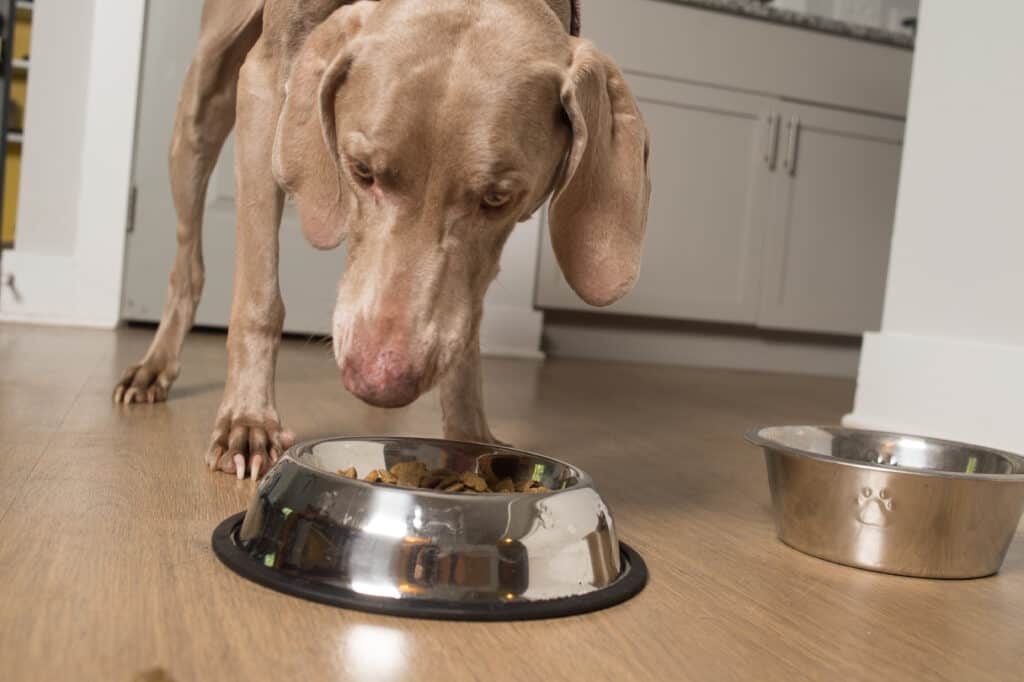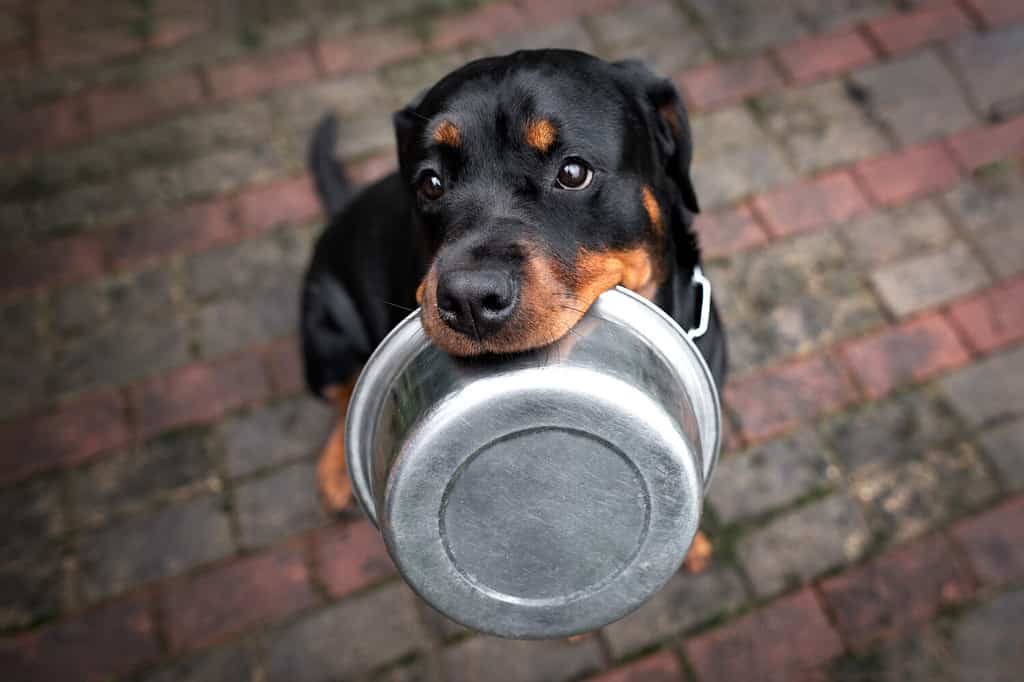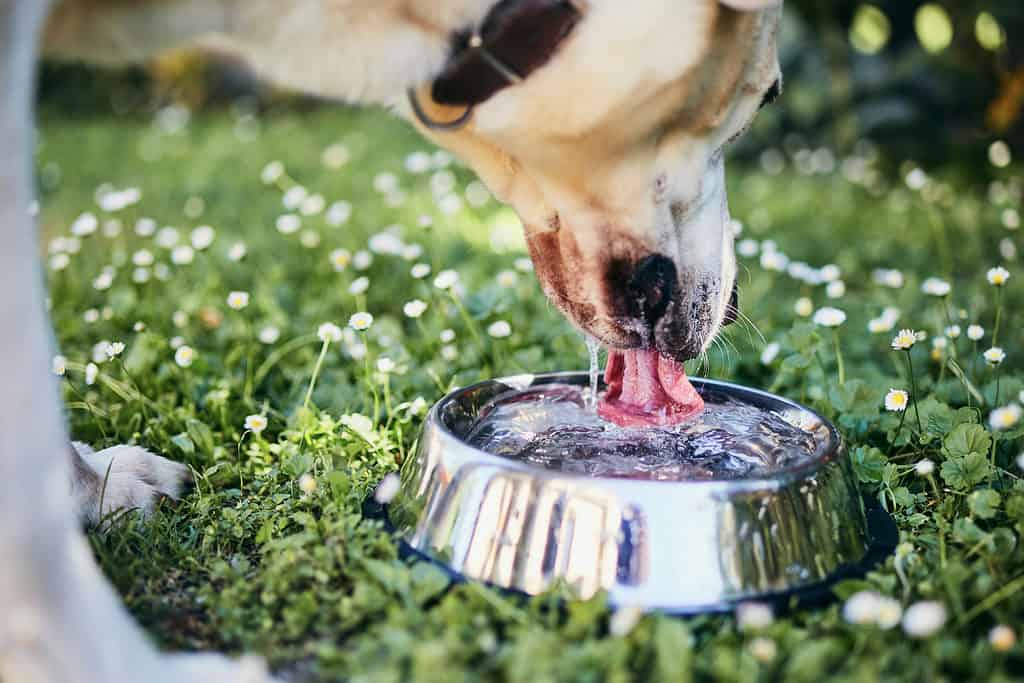Like humans, dogs may experience bouts of vomiting throughout their lives. Sometimes, they eat so fast that their tummies can’t handle it and they end up spitting it all back out. Other times, they might be sick. Is your dog throwing up yellow? This typically indicates the presence of bile, a digestive fluid that helps break down your dog’s food. Learn six reasons why your dog is throwing up yellow! Plus, learn about possible treatment options to help your pup.
Six Reasons Why Your Dog is Throwing Up Yellow
1. Food Allergy
If you recently introduced a new food to your dog’s diet, throwing up bile may indicate that your dog is allergic to that new food type. Allergies can also appear even if you haven’t made any changes to your dog’s food. If you notice that your pup is throwing up yellow, it could be that they’re experiencing some irritation in their digestive tract. When paired with excessive licking or chewing after they finish their meals, the culprit could be food allergies.

Yellow vomit could be caused by food allergies.
©Laura Beach/Shutterstock.com
2. Intestinal Parasites
Intestinal parasites could also be the cause of your dog throwing up bile. If they’re experiencing irritation in their gastrointestinal tract, that could result in the yellow stuff you see them vomiting. Make sure that your pup is up to date with regular deworming and connect with your veterinarian to rule out this cause.
3. Gastrointestinal Disease
It is possible that your dog vomiting yellow bile is the direct result of some kind of gastrointestinal disease. This could be something like inflammatory bowel disease, but it could also be something as serious as cancer. If you suspect gastrointestinal disease, make sure to contact your veterinarian so that appropriate tests and scans can be conducted. In many cases, the yellow vomit is accompanied by other symptoms like lethargy, diarrhea, or a change in appetite.
4. Obstruction
Does your pup have a habit of chewing on and swallowing things they shouldn’t? If so, your dog may be dealing with an obstruction. This is a life-threatening cause of vomiting and if you suspect that your dog has swallowed something and it’s stuck, get to a veterinarian right away.
5. Pancreatitis
Pancreatitis is a painful condition. It points to an inflamed pancreas. Sometimes there’s a trigger and sometimes there isn’t. Along with vomiting, dogs also exhibit lethargy and experience pain in their abdominal area. This condition requires veterinary care right away.
6. Empty Tummy
Depending on your feed schedule, your dog may be going too long without meals. If that’s the case, having an empty tummy can cause your pup to vomit yellow bile. This condition is called bilious vomiting syndrome.

An empty stomach could cause your dog to throw up bile.
©otsphoto/Shutterstock.com
Treatment Options
Dietary Changes
If you’re dealing with a food allergy, pancreatitis, or gastrointestinal disease, you’re likely going to need to make some changes to your dog’s diet. Something that’s easier on their digestive system that your veterinarian recommends could help your dog feel more comfortable. Determine with your vet if this is a temporary change or if you may need to keep your pup on a special diet long-term.
Lifestyle Modifications
If you have been feeding your dog once or twice a day, you may need to make some changes to your lifestyle and your dog’s lifestyle. Breaking down meals into smaller portions given throughout the day can help to alleviate vomiting when the cause is an empty tummy. You may also need to make changes around the home to ensure that your dog can’t get into any toys or socks or anything else they might grab and accidentally (or intentionally!) swallow.
Medication
As needed, your dog may need to take medication. If it’s a gastrointestinal disease, pancreatitis, or intestinal parasites, your veterinarian will put together a plan of care to ensure your dog gets the support they need.
Prevention
Smaller Meals
Instead of providing your dog with big meals, break those meals down into smaller portions. This is a lifestyle change for both of you but can greatly improve your dog’s condition.
Ensure Proper Hydration
To keep your pup healthy, make sure that there’s always fresh water available for them to drink throughout the day, especially when the weather gets warmer.

Ensure your dog always has access to clean water to stay hydrated.
©Jaromir Chalabala/Shutterstock.com
Ease Into Dietary Changes
If you do have to make any changes to your dog’s diet, make sure that you ease them into it. Switching them over to a different food too quickly can shock their system. Their bodies may reject the new food. It’s better to introduce new food slowly over the course of two weeks.
With pups, it could be nothing or it could be something serious. If you’ve noticed that your dog is throwing up yellow, especially when vomiting is combined with other symptoms, it’s always best to reach out to your veterinarian. They know your dog’s history, they can run tests, and they can help you develop an appropriate plan of care to get your favorite canine feeling better.
The photo featured at the top of this post is © iStock.com/adogslifephoto
Ready to discover the top 10 cutest dog breeds in the entire world?
How about the fastest dogs, the largest dogs and those that are -- quite frankly -- just the kindest dogs on the planet? Each day, AZ Animals sends out lists just like this to our thousands of email subscribers. And the best part? It's FREE. Join today by entering your email below.
Thank you for reading! Have some feedback for us? Contact the AZ Animals editorial team.






